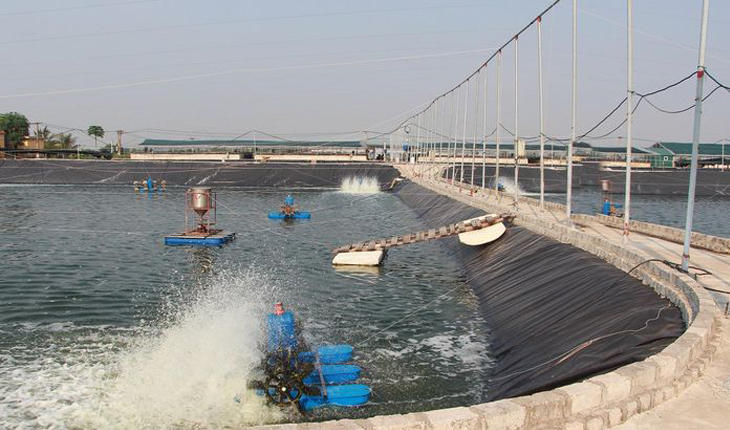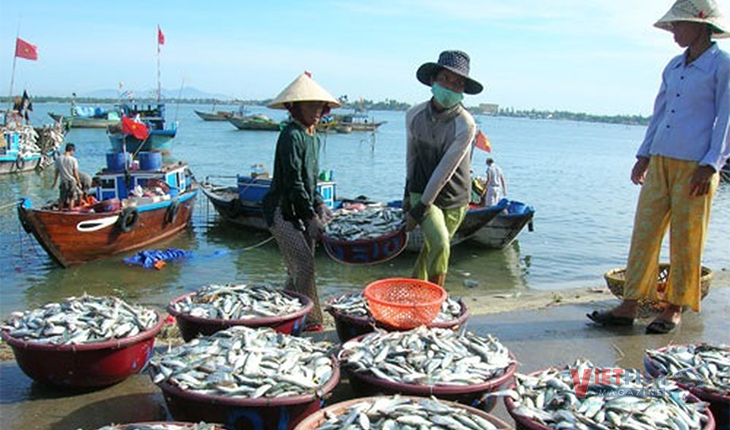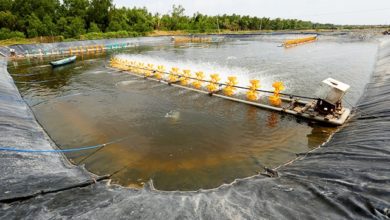Nghệ An: Outbreak of white spot syndrome virus hits shrimp farmers hard
Shrimp are found dead in mass due to the red body disease, white spot syndrome and acute hepatopancreatic necrosis. The disease spread to all major regions is inevitable.
Since the beginning of 2022 till earlier June 2022, the disease outbreak has occurred in 109/191 shrimp ponds located in four districts: Hoàng Mai, Quỳnh Lưu, Nghi Lộc and Diễn Châu, with a total of 65.57 ha being damaged.
As many as 34.98 ha of shrimp ponds are infected with white disease syndrome, 28.87 hectares are infected with acute hepatopancreatic necrosis and 1.72 hectares are damaged by environmental factors. The disease outbreak has occurred mainly in intensive and semi-intensive farms in Hoàng Mai and Quỳnh Lưu.
Farmer Nguyễn Bảo Dũng, in Quỳnh Xuân ward of Hoàng Mai town, stocked postlarvae in a 1.6ha pond in this crop. However, shrimp were found dead just after one month. “For recent years, shrimp have been all found positive to acute hepatopancreatic necrosis, white spot syndrome virus and red body disease just after being stocked for tens of days. We are suffering from the most serious loss this year as all shrimp ponds are infected, resulting in large economic damages. Unqualified PLs are to blame initially.
After devoting twelve years to shrimp culture, this is the first time farmer Nguyễn Thị Hằng (in Quỳnh Lộc of Hoàng Mai town) has suffered such a great loss. After having stocked three crops on 10 grow-out ponds of 4.5ha since March, she witnessed disease outbreaks in all the three crops.
“After being stocked for 30-45 days, shrimp would be infected with red body and white spot syndrome diseases, leading to a massive death at last. We had to conduct an early harvest and sell them all at low prices to get as much money as we could. We would have earned billions dong from five ponds at the harvest time, and yet we had to bargain away to get just tens of million dong when diseases broke out”, said Hằng.
Quỳnh Xuân has the largest shrimp farming area in Hoàng Mai town, nealy 100ha, with 47 households related to shrimp culture. The average income has been around 30-40 billion dong; therefore, lots of households got rich from shrimp culture. However, more and more grow-out ponds have been infected with diseases and the Covid-19 pandemic has brought down shrimp prices, leading to poor sales and difficulties suffered by shrimp farmers. Since earlier this year, tens of households related to shrimp culture have faced disease outbreaks, with over 40ha being infected.
According to farmers, it costs hundreds of million dong to stock shrimp in a one-hectare pond. The skyrocketing of feed price and production costs and fluctuating shrimp prices have made shrimp farmers suffer from great losses for the last two years. In 2022 when the pandemic is controlled, shrimp prices are stable and in an up-ward trend, farmers are eager for the new crop; unfortunately, they also have to face lots of challenges due to disease outbreaks.
According to analysis by the Sub-department of Livestock production and Animal Health, the infection was caused by many factors. Firstly, the asynchronous planning of infrastructure is to blame. Secondly, early stocking was carried out by some households against recommendations by the Department of Agriculture and Rural Development, resulting in inevitable disease outbreaks in the face of environmental changes. When shrimps were infected, farmers decided to handle themselves or carry out an early harvest without reporting to competent authorities for a proper solution. Moreover, unpredictable weather caused shrimps to get shocked and reduce their resistance, resulting in a disease outbreak.
An unannounced examination carried out in farming areas of districts with intensive and semi-intensive practices showed that some dangerous pathogens existed (AHPND, WSSV). Besides, quick, negative and unpredictable weather changes caused stunted growth in shrimp and trigger pathogens.
VFM






